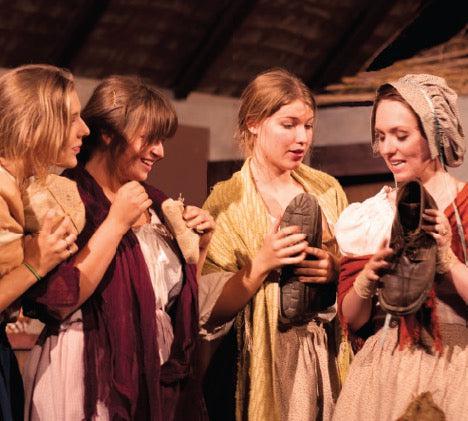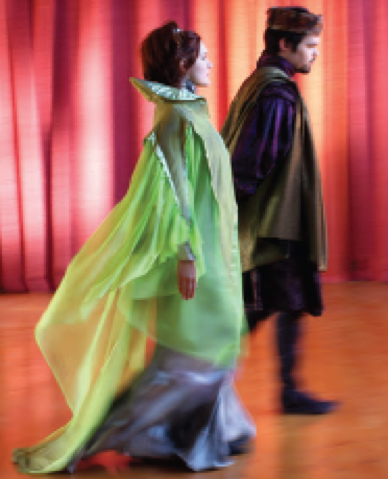Why a Class Play in Waldorf Schools? February 08 2018
The class play gives a teacher many chances to build the social strength in the class. It often also reinforces aspects of the curriculum. It changes the routine in a stimulating artistic way that provides relief from the steady rhythm of the days and weeks and months of the school year. This relief returns when the regular rhythm returns and the class feels the ordinary soothing events of life replace the dynamic and artistic tension of preparing a play and performing it.

Plays in a Waldorf school are called “pedagogical” dramas for a very good reason. They are aids to the class teacher in developing skill and capacity in students, strengthening the sense of interdependence in the whole class, and brightening the creativity of the class through drama. Some teachers elect to do a play only every other year or every three years. This is entirely at the teacher’s discretion. A certain class might need uninterrupted rhythm or concentrated work on a subject, for example, instead of a play. The teacher decides on the play and the casting. Often an unlikely candidate for a lead part in a play or an obvious leader for a small part can surprise everyone, unlikely roles to all but the teacher!The teacher might be looking to stretch of a child’s ability.
Sometimes teachers engage students in paper maché, painting, and dying for set design, or sewing and fabric arts for costumes. Music and dance are often included in plays. Singers and instrumentalists alike are included. The range of possibility is many in a class play. This presents a good rationale for doing a play, the combining of many artistic undertakings to make a beautiful play.
Dramatic arts are also used by teachers in several non-performing ways. Sometimes a teacher will write a short piece for an assembly, not meant for high performance, that is only seven to ten minutes long. These are often designed to bring an academic point home strongly. Sometimes a teacher will ask a class to remember a story by acting it out. A box of silk pieces and belts and capes can enhance this experience.
The whole artistic approach for Waldorf teachers includes all the arts: music, drawing, painting, sculpting of all sorts (clay, beeswax, wood, stone), music making and singing, drama, speech formation, dance, and collages of several of these arts. The class play is one significant opportunity for a collaboration of arts.
 As with all the arts, confusion about the product and the actual goals can occur. We do get confused in Waldorf schools about the “best paintings,” and the “most beautiful sculptures,” or the most stunning main lesson books, the most beautiful singers, the most talented instrumentalists. Using all the arts carries the goal of clear thinking and deep inner experience during the experience. The displayable results are mere vestiges of the child’s artistic experience that brings the meaning home to the sensibilities of the young artist. In the culture of North America, the preoccupation with “talent” and “genius,” or the personality-driven aspect of our culture can make it very hard to stay with the essentials of why we actually do plays in Waldorf classes.
As with all the arts, confusion about the product and the actual goals can occur. We do get confused in Waldorf schools about the “best paintings,” and the “most beautiful sculptures,” or the most stunning main lesson books, the most beautiful singers, the most talented instrumentalists. Using all the arts carries the goal of clear thinking and deep inner experience during the experience. The displayable results are mere vestiges of the child’s artistic experience that brings the meaning home to the sensibilities of the young artist. In the culture of North America, the preoccupation with “talent” and “genius,” or the personality-driven aspect of our culture can make it very hard to stay with the essentials of why we actually do plays in Waldorf classes.Of course, one wishes for a good play with high drama or effective comedy. If a casting decision is to give an unlikely candidate a prized part, the results could be less than satisfying dramatically than it might be with the “most talented” in a class. Reviews by Vanity Fair or The New Yorker standards might name the class plays a flop! But it might just be a very effective pedagogical play.
If the teacher gives the play away to a theater professional and auditions are the way to cast the play, the artistic merit of the play by worldly standards might improve, but the pedagogical impact will certainly suffer. The participation of parents in the class play can be a complicating factor as well. Sometimes parents have strong feelings about the part their child should have, or about the play the teacher has written or chosen, or about how the production should go. This adds stress to an already creatively stressful process and is often driven by cultural expectations and not by the pedagogical ideals mentioned already. And surprising things can happen: one part a performer had was as Nana, the dog, in a rendition of Peter Pan, who had no lines and brought the house down with the comedic gestures of the canine nanny.
The ultimate satisfaction of a class in its play is the successful immersion into the characters and the story of a play. Once the play is performed, the audience’s comprehension of the story, the laughter, and tears the performers feel for one scene or another from the audience are like icing on a well-baked cake. Children do learn to depend on each other in a new way from the ordinary, and students do change after deeply entering into a character unlike their own. Students find new voices in themselves, new motivations, new friends, a new appreciation for each other through interaction on stage. Sacrifice is needed for a good play: the sacrifice of one’s personality for another, sacrifice of preference for the good of the play, sacrifice of friends to interact with unlikely companions for the play, sacrifice of many preferences for the sake of a good play. And the sacrifice of repeated rehearsal might be the biggest sacrifice of all!
In the end, a class play is a lot of fun and excitement; the rewards of many weeks of hard work. Unlike other arts, it is such a social art and is shared socially with the whole community. Live theater is always thrilling because unlike a film; no one knows what is going to happen on stage nor how the actors will react. Many is the time that class teachers instruct, “Whatever happens remember who your character is and respond in that character, no matter what!” It brings lessons for life with these facts. It isn’t so much what happens — things will always happen — it’s how we respond that makes the story so compelling! So, practice for the play begets practice for life, a gift well beyond a performance or two!
Additional Reading
 |
 |
|
Stages of Imagination |
Pedagogical Theater |
